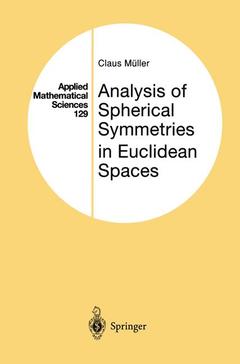Description
Analysis of Spherical Symmetries in Euclidean Spaces, 1998
Applied Mathematical Sciences Series, Vol. 129
Author: Müller Claus
Language: English
Subjects for Analysis of Spherical Symmetries in Euclidean Spaces:
Publication date: 10-2012
226 p. · 15.5x23.5 cm · Paperback
226 p. · 15.5x23.5 cm · Paperback
Description
/li>Contents
/li>Comment
/li>
This book gives a new and direct approach into the theories of special functions with emphasis on spherical symmetry in Euclidean spaces of ar bitrary dimensions. Essential parts may even be called elementary because of the chosen techniques. The central topic is the presentation of spherical harmonics in a theory of invariants of the orthogonal group. H. Weyl was one of the first to point out that spherical harmonics must be more than a fortunate guess to simplify numerical computations in mathematical physics. His opinion arose from his occupation with quan tum mechanics and was supported by many physicists. These ideas are the leading theme throughout this treatise. When R. Richberg and I started this project we were surprised, how easy and elegant the general theory could be. One of the highlights of this book is the extension of the classical results of spherical harmonics into the complex. This is particularly important for the complexification of the Funk-Hecke formula, which is successfully used to introduce orthogonally invariant solutions of the reduced wave equation. The radial parts of these solutions are either Bessel or Hankel functions, which play an important role in the mathematical theory of acoustical and optical waves. These theories often require a detailed analysis of the asymptotic behavior of the solutions. The presented introduction of Bessel and Hankel functions yields directly the leading terms of the asymptotics. Approximations of higher order can be deduced.
1 Notations and Basic Theorems>.- 1 The General Theory 9.- §2 Primitive Spaces.- §3 The Completeness.- §4 The Funk-Hecke Formula.- §5 Representations and Interpolations.- §6 Homogeneous Harmonics.- 2 The Specific Theories.- §7 The Legendre Polynomials.- §8 The Laplace Integrals.- §9 The Gegenbauer Polynomials.- §10 The Associated Legendre Functions.- §1 The Associated Spaces yjn(q).- §12 Harmonic Differential Operators.- §13 Maxwell’s Theory of Multipoles.- 3 Spherical Harmonics and Differential Equations.- §14 The Laplace-Beltrami Operators.- §15 Spherical Harmonics as Eigenfunctions.- §16 The Legendre Differential Equation.- §17 The Legendre Functions as Hypergeometric Functions.- 4 Analysis on the Complex Unit Spheres.- §18 Homogeneous Harmonics in ?q.- §19 Invariant Integrals on S*q-1.- §20 Complexification of the Funk-Hecke Formula.- §21 An Alternative System of Legendre Functions.- 5 The Bessel Functions.- §22 Regular Bessel Functions.- §23 Regular Hankel Functions.- §24 Recursive and Asymptotic Relations.- §25 Addition Formulas for Hankel Functions of Order Zero.- §26 Exponential Integrals with Bessel Functions.- §27 The Traditional Notations.- 6 Integral Transforms.- §28 Fourier Integrals.- §29 The Fourier Representation Theorem.- §30 The Parseval Identity.- §31 Examples.- 7 The Radon Transform.- §32 Radon Transforms and Fourier Transforms.- §33 Radon Transforms and Spherical Symmetries.- §34 The Nicholson Formulas.- 8 Appendix.- §35 The ?-Function..- §36 The Hypergeometric Function.- §37 Elementary Asymptotics.- References.
Self-contained work * Much material published here for the first time * Uses elementary concepts of the theory of invariants of orthogonal groups and harmonics Results treated in an appendix to avoid disrupting the course of the ideas
© 2024 LAVOISIER S.A.S.
These books may interest you

Geometries and Transformations 86.49 €



